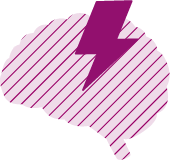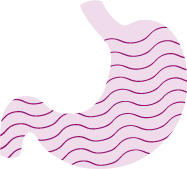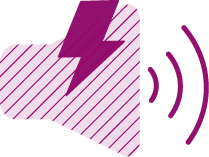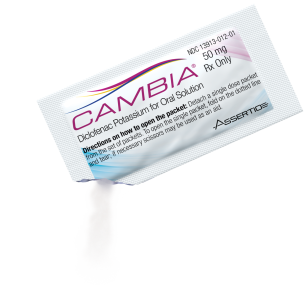x


®
Get started on CAMBIA (diclofenac potassium) with Cove
CAMBIA is available through Cove, a telemedicine company focused on migraine. Cove can connect you with a licensed healthcare provider who will manage your migraine care and help you get CAMBIA delivered right to your door if appropriate.
That way, when your next migraine strikes,
you can count on CAMBIA
INDICATION
CAMBIA is a prescription medicine used to treat migraine attacks in adults. It does not prevent or lessen the number of migraines you have, and it is not for other types of headaches. CAMBIA contains diclofenac potassium (a non-steroidal anti-inflammatory drug or NSAID).
What is the most important information I should know about CAMBIA?
CAMBIA contains diclofenac (a non-steroidal anti-inflammatory drug or NSAID).
NSAIDs, including CAMBIA, can cause serious side effects, including:
- Increased risk of a heart attack or stroke that can lead to death. This risk may happen early in treatment and may increase:
- with increasing doses of NSAIDs
- with longer use of NSAIDs
Do not take NSAIDs, including CAMBIA, right before or after a heart surgery called a “coronary artery bypass graft (CABG).”
Avoid taking NSAIDs, including CAMBIA, after a recent heart attack, unless your healthcare provider tells you to. You may have an increased risk of another heart attack if you take NSAIDs after a recent heart attack.
- Increased risk of bleeding, ulcers, and tears (perforation) of the esophagus (tube leading from the mouth to the stomach), stomach and intestines:
- anytime during use
- without warning symptoms
- that may cause death
Please see full Prescribing Information including BOXED WARNING and Medication Guide for more information about CAMBIA.
Count on CAMBIA
CAMBIA is a prescription medicine used to treat migraine attacks in adults. It does not prevent or lessen the number of migraines you have, and it is not for other types of headaches. CAMBIA contains diclofenac potassium (a non-steroidal anti-inflammatory drug or NSAID).
Cambia can treat multiple symptoms of acute migraine attacks, including:




Photophobia (sensitivity to light)
Phonophobia (sensitivity to sound)
Migraine pain
Nausea
IMPORTANT SAFETY INFORMATION (continued)
The risk of getting an ulcer or bleeding increases with:
- past history of stomach ulcers, or stomach or intestinal bleeding with use of NSAIDs
- taking medicines called “corticosteroids”, “anticoagulants”, “SSRIs”, or “SNRIs”
- increasing doses of NSAIDs
- longer use of NSAIDs
- smoking
- drinking alcohol
- older age
- poor health
- advanced liver disease
- bleeding problems
CAMBIA should only be used:
- exactly as prescribed
- at the lowest dose possible for your treatment
- for the shortest time needed
Please see additional Important Safety Information below
How Cove Works



1. Tell us about your migraine
2. Leave the details to us
3. Receive ongoing support
Cove gets your medication shipped right to your door on the schedule you choose.
Complete an online consultation so your Cove medical provider can find the best treatment plan for your needs.
Cove's team checks in with you over time to provide additional support and make sure you're always getting the care you deserve.
CAMBIA can provide rapid relief

CAMBIA can work quickly—in as little as 15 minutes in some patients
1

IMPORTANT SAFETY INFORMATION (continued)
Who should not take CAMBIA?
Do not take CAMBIA:
- if you have had an asthma attack, hives, or other allergic reaction with aspirin, diclofenac, or any other NSAIDs.
- right before or after heart bypass surgery.
Before taking CAMBIA, tell your healthcare provider about all your medical conditions, including if you:
- have liver or kidney problems
- have a history of stomach ulcer or bleeding in your stomach or intestines
- have any allergies to any medicines
- have chest pain, shortness of breath, irregular heartbeats
- have high blood pressure
- have asthma
- are pregnant, think you might be pregnant, or are trying to become pregnant. CAMBIA should not be used by pregnant women, especially after 29 weeks of pregnancy unless directed by your healthcare provider to do so. CAMBIA may cause problems in your unborn child or complications during your delivery
- are breastfeeding or plan to breastfeed. It is not known if CAMBIA passes into your breast milk. You and your doctor should decide if you will take CAMBIA or breastfeed. You should not do both
- have a headache that is different from your usual migraine
Learn more about CAMBIA and its Important Safety Information
Why Cove's Telemedicine is Effective
Specialized Care
Available
Cove only treats migraine. Our program is overseen by world-leading experts in headache medicine, to ensure you get the highest quality of care from consultation to ongoing support.
Your migraine isn't on a 9-5 schedule, so neither is Cove. Message your dedicated Cove medical provider day or night and they'll get back to you as soon as possible.
Personalized
Integrated
Log your migraine in Cove’s migraine tracker, and the data will be sent to your Cove medical provider to help identify your triggers to get you the relief you deserve.
You are matched with a Cove medical provider who follows you over time. Your medical provider learns about your migraine and tailors treatment specifically to your needs.
Taking CAMBIA
Ready on the go: Just empty the contents of CAMBIA packet into 1 - 2 ounces of water, mix well, and drink the water and powder mixture immediately. Do not mix with liquids other than water.
Learn more about CAMBIA and its Important Safety Information
INDICATION
CAMBIA is a prescription medicine used to treat migraine attacks in adults. It does not prevent or lessen the number of migraines you have, and it is not for other types of headaches. CAMBIA contains diclofenac potassium (a non-steroidal anti-inflammatory drug or NSAID).
IMPORTANT SAFETY INFORMATION
WARNING: RISK OF SERIOUS CARDIOVASCULAR AND GASTROINTESTINAL EVENTS
CAMBIA is a non-steroidal anti-inflammatory drug (NSAID). NSAIDs cause an increased risk of a heart attack or stroke that can lead to death. This chance is higher with longer use of NSAID medicines and in people who have heart disease. CAMBIA should never be used right before or after a heart surgery called a “coronary artery bypass graft (CABG)”.
NSAID medicines cause an increased risk of stomach and intestine problems, such as ulcers and bleeding, which can happen without warning and may cause death. This risk increases with use of steroids (corticosteroids), blood thinners (anticoagulants), smoking, alcohol use, older age, for those in poor health, advanced liver disease, and bleeding problems.
What is the most important information I should know about CAMBIA?
CAMBIA contains diclofenac (a non-steroidal anti-inflammatory drug or NSAID).
NSAIDs, including CAMBIA, can cause serious side effects, including:
- Increased risk of a heart attack or stroke that can lead to death. This risk may happen early in treatment and may increase:
- with increasing doses of NSAIDs
- with longer use of NSAIDs
- Do not take NSAIDs, including CAMBIA, right before or after a heart surgery called a “coronary artery bypass graft (CABG).”
Avoid taking NSAIDs, including CAMBIA, after a recent heart attack, unless your healthcare provider tells you to. You may have an increased risk of another heart attack if you take NSAIDs after a recent heart attack.
- Increased risk of bleeding, ulcers, and tears (perforation) of the esophagus (tube leading from the mouth to the stomach), stomach and intestines:
- anytime during use
- without warning symptoms
- that may cause death
The risk of getting an ulcer or bleeding increases with:
- past history of stomach ulcers, or stomach or intestinal bleeding with use of NSAIDs
- taking medicines called “corticosteroids”, “anticoagulants”, “SSRIs”, or “SNRIs”
- increasing doses of NSAIDs
- longer use of NSAIDs
- smoking
- drinking alcohol
- older age
- poor health
- advanced liver disease
- bleeding problems
CAMBIA should only be used:
- exactly as prescribed
- at the lowest dose possible for your treatment
- for the shortest time needed
Who should not take CAMBIA?
Do not take CAMBIA:
- if you have had an asthma attack, hives, or other allergic reaction with aspirin, diclofenac, or any other NSAIDs.
- right before or after heart bypass surgery.
Before taking CAMBIA, tell your healthcare provider about all your medical conditions, including if you:
- have liver or kidney problems
- have a history of stomach ulcer or bleeding in your stomach or intestines
- have any allergies to any medicines
- have chest pain, shortness of breath, irregular heartbeats
- have high blood pressure
- have asthma
- are pregnant, think you might be pregnant, or are trying to become pregnant. CAMBIA should not be used by pregnant women, especially after 29 weeks of pregnancy unless directed by your healthcare provider to do so. CAMBIA may cause problems in your unborn child or complications during your delivery
- are breastfeeding or plan to breastfeed. It is not known if CAMBIA passes into your breast milk. You and your doctor should decide if you will take CAMBIA or breastfeed. You should not do both
- have a headache that is different from your usual migraine
Tell your doctor about all the medicines you take, including prescription or over-the-counter medicines, vitamins, or herbal supplements. NSAIDs, like CAMBIA, and some other medicines can interact with each other and cause serious side effects. Do not start taking any new medicine without talking to your healthcare provider first.
Especially tell your doctor if you take:
- aspirin
- any anticoagulant medicines (warfarin, Coumadin, Jantoven)
Know the medicine you take. Keep a list of your medicines and show it to your doctor and pharmacist when you get a new medicine.
What are the possible side effects of CAMBIA?
CAMBIA can cause serious side effects, including:
See “What is the most important information I should know about CAMBIA?”
- new or worse high blood pressure
- heart failure
- liver problems including liver failure
- kidney problems including kidney failure
- bleeding and ulcers in the stomach and intestine
- low red blood cells (anemia)
- life-threatening skin reactions
- life-threatening allergic reactions
- asthma attacks in people who have asthma
- medication overuse headaches. Some people who use too much CAMBIA may have worse headaches (medication overuse headache). If your headaches get worse, your healthcare provider may decide to stop your treatment with CAMBIA.
Other side effects of NSAIDs include: stomach pain, constipation, diarrhea, gas, heartburn, nausea, vomiting, and dizziness.
Get emergency help right away if you get any of the following symptoms:
- shortness of breath or trouble breathing
- chest pain
- weakness in one part or one side of your body
- slurred speech
- swelling of the face or throat
Stop CAMBIA and call your healthcare provider right away if you have any of the following symptoms:
- nausea that seems out of proportion to your migraine
- sudden or severe pain in your belly
- more tired or weaker than usual
- diarrhea
- itching
- your skin or eyes look yellow
- indigestion or stomach pain
- vomit blood
- there is blood in your bowel movement or it is black and sticky like tar
- unusual weight gain
- skin rash or blisters with fever
- swelling of the arms, legs, hands and feet
- flu-like symptoms
If you take too much of your NSAID, call your healthcare provider or get medical help right away.
These are not all the possible side effects of NSAIDs. For more information, ask your healthcare provider or pharmacist about NSAIDs.
Call your doctor for medical advice about side effects. You may report side effects to FDA at 1-800-FDA-1088.
Please click for full Prescribing Information including BOXED WARNING and Medication Guide for more information about CAMBIA and discuss it with your doctor.
Cambia and the Cambia logo are registered trademarks of Assertio Therapeutics
References
- Diener HC, Montagna P, Gács G, et al. Efficacy and tolerability of diclofenac potassium sachets in migraine: a randomized, double-blind, cross-over study in comparison with diclofenac potassium tablets and placebo. Cephalalgia. 2006;26(5):537-547.

